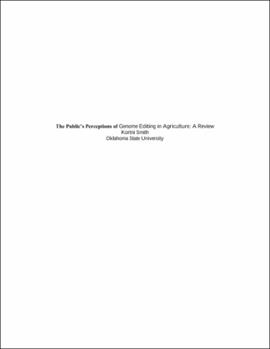| dc.contributor.author | Smith, Kortni | |
| dc.date.accessioned | 2022-01-04T15:38:37Z | |
| dc.date.available | 2022-01-04T15:38:37Z | |
| dc.date.issued | 2021-11-19 | |
| dc.identifier | oksd_smith_HT_2021 | |
| dc.identifier.uri | https://hdl.handle.net/11244/332577 | |
| dc.description.abstract | Genome editing has been debated by scientists, consumers, and the general public since its conception. It is important to understand these debates and every side’s views in order to move forward with the technology. The members of the public are involved in the laws and legislations that govern the use of technologies like gene editing. Scientists can use the public’s opinions to determine how to move forward with gene editing. Genome editing consists of using sequence specific nucleases (SSNs) to edit a genome for a desired effect. There are various uses of genome editing which have varying levels of acceptance by the public. Studies have found more acceptance towards gene editing use in agriculture when compared to use in humans. There is a lack of research in the area of the public’s perception of genome editing in agricultural and animal agriculture applications. Many consumers would agree to consume genetically edited food products in certain situations, but not in all. There are specific instances, such as gluten intolerance, that drive the public’s acceptance of gene editing technologies in food production. There are also varying levels of acceptance of genome editing in animal agriculture, with more acceptance of genetic editing use in animal agriculture when it impacts animal welfare positively. Applications such as using this technology to create polled cattle through genome editing are more accepted because of its impact on animal welfare. A large portion of the literature on this topic looks into the public’s perception of genome editing in humans, which can be used to make valuable inferences about what the public might think about the same technology used in agriculture or animals. There is also a lack of education on these topics which may influence the public’s opinions. Without full education on the topic people may argue against genome editing simply because they do not understand it. Understanding the public’s perceptions of gene editing and why they have those perceptions is important to the future of the technology and any laws or regulations that may be created around it. | |
| dc.format | application/pdf | |
| dc.language | en_US | |
| dc.rights | Copyright is held by the author who has granted the Oklahoma State University Library the non-exclusive right to share this material in its institutional repository. Contact Digital Library Services at lib-dls@okstate.edu or 405-744-9161 for the permission policy on the use, reproduction or distribution of this material. | |
| dc.title | Public's perceptions of genome editing in agriculture: A review | |
| osu.filename | oksd_smith_HT_2021.pdf | |
| osu.accesstype | Open Access | |
| dc.type.genre | Honors Thesis | |
| dc.type.material | Text | |
| dc.contributor.director | Zhang, Glenn | |
| dc.contributor.facultyreader | DeSilva, Udaya | |
| thesis.degree.discipline | Animal Science | |
| thesis.degree.grantor | Oklahoma State University | |
